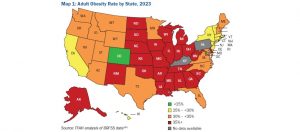(Radio Iowa) – A new report shows Iowans are continuing to pack on the pounds, with more than one in every three Iowa adults now being considered obese. Dr. Nadine Gracia, president and CEO of Trust for America’s Health, says the national report places Iowa tied for seventh with Indiana for the most overweight states. “Iowa, in the latest data shows that the rate of obesity among adults is at about 37%, not a significant difference from the previous year, but what’s more important is really that we look at trends,” Gracia says. “When we look at the state over the past five years, there has been a significant increase, demonstrating that there is a need to continue to really work on addressing adult and childhood obesity.”
The report shows Iowa’s young people are mirroring the adults in seeing elevated weights. “Rates of childhood obesity at the national level is at about nearly 20%,” Gracia says. “For children in the state of Iowa, between the ages of six to 17, that rate is about 15%, again, also seeing over time increases.” About ten years ago, the report found -zero- states with an adult obesity rating over 35-percent, while the new report puts Iowa — and almost half of all states — in that category.
“Now, 23 states have adult obesity rates at or above 35%,” Gracia says. “When we also look at the last five years, we’re seeing that actually about more than half of all the states in the country have experienced an increase in their adult obesity rate.” Obesity is a complicated issue to diagnose, and she calls it a national public health issue that goes far beyond individual behavior. “We also know how your environment, whether you have access to affordable, healthy, nutritious foods, living in a neighborhood where you can engage safely in physical activity,” Gracia says, “those types of structural factors are really important as it relates to risk for obesity.”

Trust for America’s Health graphic
Other factors may include medications, genetics, other health issues, and stress. The report shows West Virginia has the highest obesity rate at 41-percent, while Colorado ranked the lowest with 25-percent.
See the full State of Obesity 2024 report.






